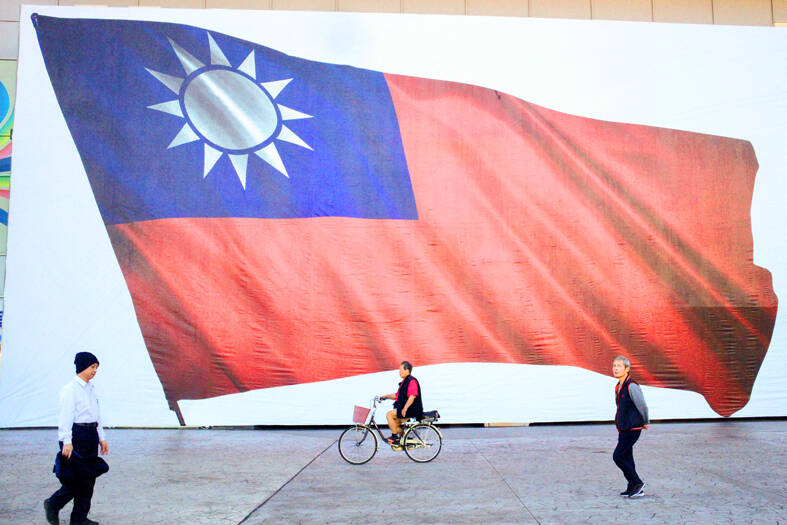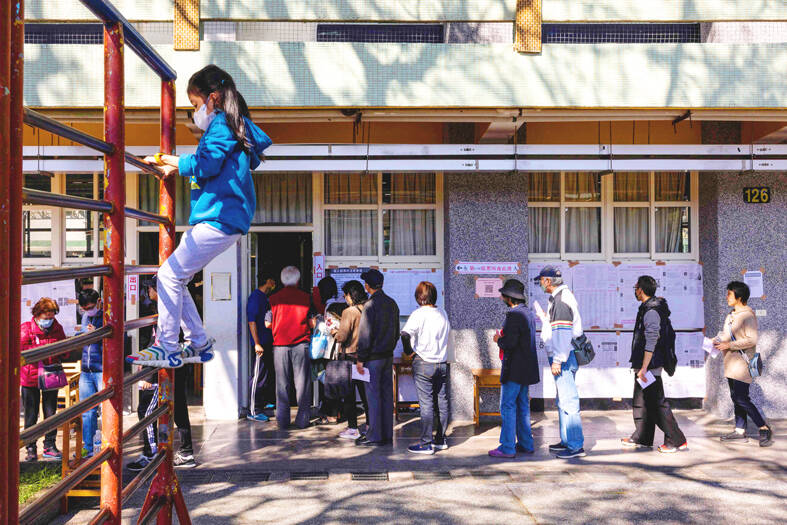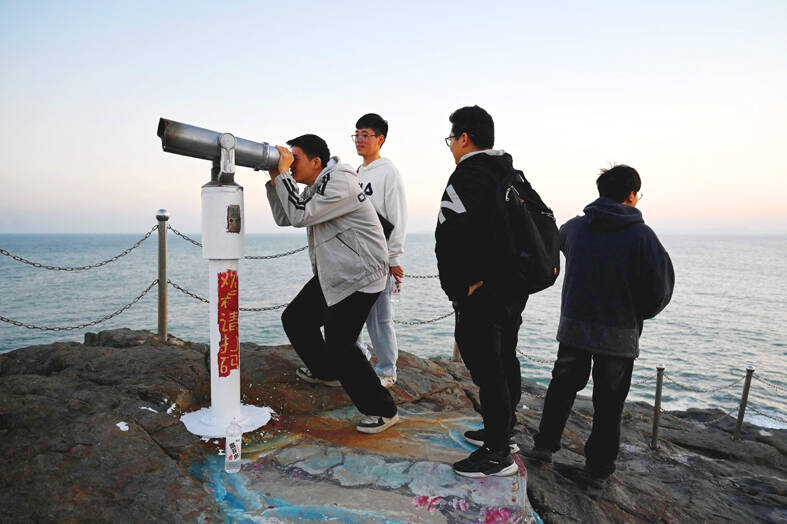Taiwan’s elections yesterday might be exercising minds in communist-ruled China, but for the voters streaming into kindergartens, temples and libraries across the nation, Beijing’s threats to their democracy are just part of everyday life.
“It’s a bit too far away from us,” said Joyce, a voter in her 20s who arrived at an elementary school in New Taipei City to cast her ballot with her twin siblings.
Beijing stepped up its rhetoric in the run-up to yesterday’s polls with dire warnings of conflict and fiery threats to “crush” moves toward independence.

Photo: Sam Yeh, AFP
However, Joyce and her brothers are more interested in better salaries and lower property prices.
“Also better public transportation and cracking down on spam activities,” her brother Jacky said.
His twin, Rocky, said he thought China “doesn’t have extra capacity to invade us.”

Photo: Alastair Pike, AFP
“And I am not sure whether I will fight in the front line if war breaks out,” he told reporters.
China’s increasingly bellicose relationship with Taiwan was a dominant issue in the race to yesterday’s elections, with candidates castigating each other over how their superpower neighbor should be handled.
Chinese President Xi Jinping (習近平) has never ruled out using force to take Taiwan under Beijing’s control.

Photo: Greg Baker, AFP
Declaring de jure independence is a red line for Beijing’s leadership, but a voter surnamed Chen (陳) said that the current reality of polling day, in which millions across the nation picked a new leader, showed Xi’s rhetoric was behind the times.
“We are still electing a president — isn’t that tantamount to independence?” 46-year-old Chen said.
Strolling around the Chiang Kai-shek Memorial Hall — commemorating the Chinese Nationalist Party (KMT) leader who fled China after defeat by the Chinese Communist Party — Chen also shrugged off China’s ramped-up military pressures on Taiwan, which have global observers worrying about a possible invasion.
“I’m not worried about war, because Taiwan has had presidents for a long time,” he said.
Nearby, a woman in her 70s said she has become “numb to the tense situation in the Taiwan Strait.”
“They [China] talk loudly and make all kinds of claims, but I think ... there won’t be any major issues,” she told reporters, declining to be identified. “Compared to the rest of the world, Taiwan is still the best. It’s a democratic country where you can freely express yourself.”
Taiwan has strict election laws for polling day that effectively prevent media from asking voters about their specific choices to avoid influencing the outcome.
It means voters often speak obliquely about their choices, while politicians yesterday were reduced to simply calling on the Taiwan public to vote — and remarking on the sunny weather after days of chill.
Fan (方), a 30-year-old doctor, had just stepped off his night shift and was blearily having breakfast before going to his registered poll center.
“If given the choice, I would probably choose to uphold my values, even if it might eventually lead to war,” he told reporters, adding that he feels “regret” for being too busy to carefully examine the platforms of each candidate.
“After all, this is my right,” Fan said.

POSITIVE DEVELOPMENT: Japan and the US are expected to hold in-depth discussions on Taiwan-related issues during the meeting next month, Japanese sources said The holding of a Japan-US leaders’ meeting ahead of US President Donald Trump’s visit to China is positive news for Taiwan, former Japan-Taiwan Exchange Association representative Hiroyasu Izumi said yesterday. After the Liberal Democratic Party’s landslide victory in Japan’s House of Representatives election, Japanese Prime Minister Sanae Takaichi is scheduled to visit the US next month, where she is to meet with Trump ahead of the US president’s planned visit to China from March 31 to April 2 for a meeting with Chinese President Xi Jinping (習近平). Japan and the US are expected to hold in-depth discussions on Taiwan-related issues during the

‘LIKE-MINDED PARTNER’: Tako van Popta said it would be inappropriate to delay signing the deal with Taiwan because of China, adding he would promote the issue Canadian senators have stressed Taiwan’s importance for international trade and expressed enthusiasm for ensuring the Taiwan-Canada trade cooperation framework agreement is implemented this year. Representative to Canada Harry Tseng (曾厚仁) in an interview with the Central News Agency (CNA) said he was increasingly uneasy about Ottawa’s delays in signing the agreement, especially as Ottawa has warmed toward Beijing. There are “no negotiations left. Not only [is it] initialed, we have three versions of the text ready: English, French and Mandarin,” Tseng said. “That tells you how close we are to the final signature.” Tseng said that he hoped Canadian Prime Minister Mark Carney

President William Lai (賴清德) yesterday bestowed one of Taiwan’s highest honors on Saint Vincent and the Grenadines (SVG) Ambassador Andrea Clare Bowman in recognition of her contributions to bilateral ties. “By conferring the Order of Brilliant Star with Grand Cordon on Ambassador Bowman today, I want to sincerely thank her, on behalf of the Taiwanese people, for her outstanding contribution to deepening diplomatic ties between Taiwan and SVG,” Lai said at a ceremony held at the Presidential Office in Taipei. He noted that Bowman became SVG’s first ambassador to Taiwan in 2019 and

A man walks past elementary school artworks at the Taipei Lantern Festival in Ximen District yesterday, the first day of the event. The festival is to run from 5pm to 10pm through March 15.